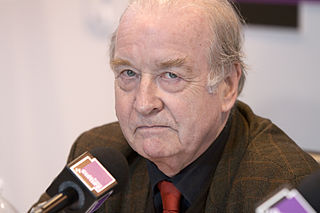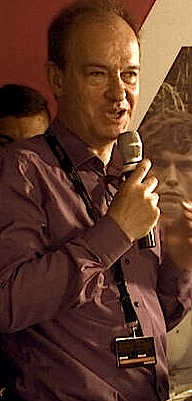Related Research Articles

Abbas Kiarostami was an Iranian film director, screenwriter, poet, photographer, and film producer. An active filmmaker from 1970, Kiarostami had been involved in the production of over forty films, including shorts and documentaries. Kiarostami attained critical acclaim for directing the Koker trilogy (1987–1994), Close-Up (1990), The Wind Will Carry Us (1999), and Taste of Cherry (1997), which was awarded the Palme d'Or at the Cannes Film Festival that year. In later works, Certified Copy (2010) and Like Someone in Love (2012), he filmed for the first time outside Iran: in Italy and Japan, respectively. His films Where Is the Friend's Home? (1987), Close-Up, and The Wind Will Carry Us were ranked among the 100 best foreign films in a 2018 critics' poll by BBC Culture. Close-Up was also ranked one of the 50 greatest movies of all time in the famous decennial Sight & Sound poll conducted in 2012.

The Apu Trilogy comprises three Indian Bengali-language drama films directed by Satyajit Ray: Pather Panchali (1955), Aparajito (1956) and The World of Apu (1959). The original music for the films was composed by Ravi Shankar.

The British Film Institute (BFI) is a film and television charitable organisation which promotes and preserves film-making and television in the United Kingdom. The BFI uses funds provided by the National Lottery to encourage film production, distribution, and education. It is sponsored by the Department for Culture, Media and Sport, and partially funded under the British Film Institute Act 1949.

David James Stratton is an English-Australian film critic and historian. He has also worked as a journalist, interviewer, educator, television personality, and producer. His career as a film critic, writer, and educator in Australia spanned 57 years, until his retirement in December 2023.
Sight and Sound is a monthly film magazine published by the British Film Institute (BFI). Since 1952, it has conducted the well-known decennial Sight and Sound Poll of the Greatest Films of All Time.

Marcel Albert Carné was a French film director. A key figure in the poetic realism movement, Carné's best known films include Port of Shadows (1938), Le Jour Se Lève (1939), Les Visiteurs du Soir (1942) and Children of Paradise (1945); the latter has been cited as one of the great films of all time.

Mark Kermode is an English film critic, musician, radio presenter, television presenter, author and podcaster. He is the co-presenter of the BBC Radio 4 programme Screenshot, and co-presenter of the film-review podcast Kermode & Mayo's Take. Kermode is a regular contributor to The Observer, for which he was chief film critic between September 2013 and September 2023.
Raymond Durgnat was a British film critic, who was born in London to Swiss parents. During his life he wrote for virtually every major English language film publication. In 1965 he published the first major critical essay on Michael Powell, who had hitherto been "fashionably dismissed by critics as a 'technician's director'", as Durgnat put it.

BFI Flare: London LGBTIQ+ Film Festival, formerly known as the London Lesbian and Gay Film Festival (LLGFF), is the biggest LGBTIQ+ film festival in Europe. It takes place every spring in London, England. Organised and run by the British Film Institute, all BFI Flare screenings take place in the BFI Southbank.

Michel Jean Ciment was a French film critic, author, and editor of the cinema magazine Positif. He was also a maître de conférences in American civilization at the University of Paris-VII.

The BFI London Film Festival is an annual film festival held in London, England, in collaboration with the British Film Institute. The festival runs for two weeks every October. In 2016, the BFI estimated that around 240 feature films and 150 short films from more than 70 countries are screened at the festival each year.

Peter Nicholas Bradshaw is a British writer and film critic. He has been chief film critic at The Guardian since 1999, and is a contributing editor at Esquire.
Richard Stanley Roud was an American writer on film and co-founder, with Amos Vogel, of the New York Film Festival (NYFF). At the NYFF, Roud was a former program director, and latterly director, from 1963 to 1987.
The Abingdon Film Unit is an organisation based at Abingdon School, Abingdon-on-Thames, in Oxfordshire, England that enables pupils to make their own short documentary or animated films under the guidance of a team of industry professionals. The AFU was formed in 2003 by British documentary maker Michael Grigsby and the school's Head of Drama, Jeremy Taylor. They led the Unit together until Grigsby's death at the age of 76 in March 2013. The Film Unit has had several films selected for screening at the National Film Theatre in London and others added to the National Film Archive.

Satyajit Ray was an Indian film director, screenwriter, author, lyricist, magazine editor, illustrator, calligrapher, and composer. Ray is widely considered one of the greatest and most influential film directors in the history of cinema. He is celebrated for works including The Apu Trilogy (1955–1959), The Music Room (1958), The Big City (1963), Charulata (1964), and the Goopy–Bagha trilogy (1969–1992).[a]

Mark Cousins is an English-born, Northern Irish director and writer. A prolific documentarian, among his best-known works is the 15-hour 2011 documentary The Story of Film: An Odyssey.
M. K. Raghavendra is an Indian film and literary scholar, critic, and writer. He has written eleven books on cinema, literature, and politics and contributed to major publications like The Hindu and The Indian Express. He received the National Award for Best Film Critic in 1997 and the Homi Bhabha Fellowship in 2000. His book Seduced by the Familiar (2008) is highly regarded in the field. Raghavendra has lectured at top Indian universities and served on international film juries. He is also the Founder-Editor of Phalanx, an online journal for debates in the humanities and social sciences.
John Gillett MBE (1925–1995) was a British film critic and researcher whose career at the British Film Institute spanned over 44 years. He was also a programmer for the National Film Theatre on the works of Buster Keaton, early Russian cinema and Japanese cinema, to name a few. He wrote film reviews for The Monthly Film Bulletin. With Ian Christie, he edited Futurism/Formalism/FEKS: 'Eccentrism' and Soviet Cinema 1918-1936. He was also an editor of Yasujiro Ozu: A Critical Anthology, with David Wilson.

Sleep Has Her House is a 2017 British experimental film written, directed, produced, scored, and edited by Scott Barley. It features no actors or dialogue.

The 66th BFI London Film Festival was a film festival that took place from 5–16 October 2022. British-American producer Tanya Seghatchian served as jury president. Marie Kreutzer's Corsage won the Best Film Award.
References
- ↑ "About". 25 April 2016.
- 1 2 3 "Geoff Andrew". British Film Institute. Retrieved 21 June 2014.
- ↑ Andrew, Dudley; Gillain, Anne (4 February 2013). A Companion to Franois Truffaut. John Wiley & Sons. p. 539. ISBN 978-1-118-32130-0.
- ↑ "Geoff Andrew | BFI". Archived from the original on 18 August 2016.